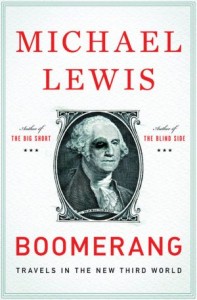Where Matt Taibbi’s Griftopia causes dangerous spikes in blood pressure, this book is written in such a way that the reader finds himself bemused rather than angered. It is as if the reader has been lulled by his vantage as a mere spectator, rather than victim. Similarly, the locales involved are shown nearly as bystanders to the economic train wreck.
I appreciate the novel approach of introducing each locale almost as a travel writer. Indeed, he even coins a phrase for it: “financial disaster tourism.” He begins each chapter with a description of the local character, then proceeds to implicate its contribution to the situation. From Iceland’s peculiar gender segregation to Greece’s pervasive tax evasion to institutionalized gelding of tax collection ability in California, Lewis uses the narrative of the disinterested party to take his audience beneath overt causation and into the deeper subtext.
I have no idea how I even got this book, but I found it fascinating. Presenting the backdrop upon which this tragedy cum farce has been painted leaves the reader with a sense of how the calamity is a patchwork quilt made up of widely disparate participants, most of whom were caught completely by surprise in what should have been obvious.

Recent Comments